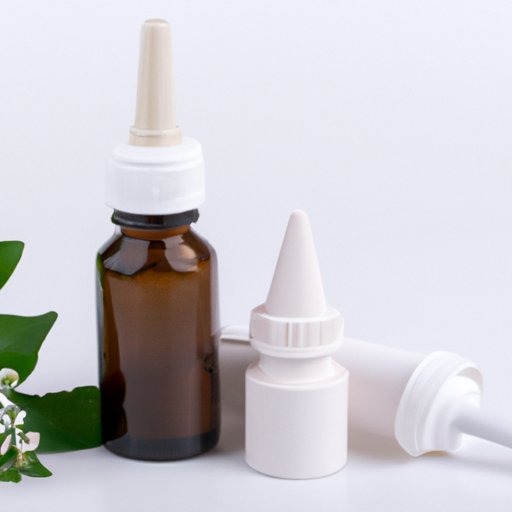
I. Introduction
There’s nothing worse than suffering from a stuffy nose. Nasal congestion can make it difficult to breathe, sleep, and enjoy daily life. Fortunately, there are many ways to alleviate a stuffy nose, from natural remedies to over-the-counter treatments and medical interventions. In this article, we explore all the options for fixing a stuffy nose so that you can find the best solution for your needs.
II. Natural Remedies
Natural remedies are a safe and effective way of clearing nasal congestion. Inhaling steam from hot water, drinking warm fluids, and consuming spicy foods are all great natural remedies. You can easily incorporate these natural remedies into your daily routine. Taking a hot shower or bath before bed, drinking hot tea or chicken soup, or adding spices such as chili pepper or ginger to your meals are all great ways to relieve congestion throughout the day.
III. Nasal Sprays
Nasal sprays are a fast-acting way to decongest the nasal passages. They work by shrinking the blood vessels in the nasal passages, reducing swelling and allowing air to flow more freely. Several nasal sprays are available over-the-counter, including Afrin and Flonase. It’s important to use nasal sprays properly to maximize their benefits. Follow the instructions on the package, and don’t use them for more than three days at a time to avoid rebound congestion.
IV. Nasal Irrigation
Nasal irrigation involves using a saline solution to rinse the nasal passages. It’s a safe and effective way to relieve congestion caused by allergies, colds, and sinus infections. You can purchase a saline rinse kit from a pharmacy or make your own solution using water and non-iodized salt. To perform nasal irrigation, lean your head over a sink or basin, and gently insert the saline solution into one nostril. Allow the solution to flow out of the other nostril and into the sink. Repeat on the other side.
V. Humidifiers
Humidifiers can provide a lot of relief in dry winter months when nasal passages are often dry and irritated. They add moisture to the air and can help alleviate nasal congestion, reduce coughing, and improve sleep quality. When picking a humidifier, consider the size of the room you want to humidify, and choose between cool or warm mist. Use distilled water with your humidifier to avoid mineral buildup.
VI. Essential Oils
Essential oils are great for reducing nasal congestion and promoting healthy breathing. Peppermint and eucalyptus oils are particularly effective. To use essential oils, add a few drops to a diffuser or to a bowl of hot water, and inhale the vapor. You can also massage diluted essential oils onto your chest and around your nostrils to promote clear breathing.
VII. Over-The-Counter Remedies
When natural remedies aren’t enough, over-the-counter treatments can provide relief. Decongestants, antihistamines, and pain relievers can all help alleviate nasal congestion. It’s important to read labels carefully and follow instructions so that you use these treatments properly. Be aware of potential side effects, such as drowsiness or rebound congestion, and avoid using these remedies for extended periods.
VIII. Medical Intervention
If you have chronic nasal congestion, it may be time to seek medical attention. Your doctor may prescribe prescription-strength medications, such as nasal corticosteroids or antihistamines, to alleviate symptoms. If you have a structural problem, such as a deviated septum, surgery may be necessary to correct it. Work with your healthcare provider to develop an effective treatment plan.
IX. Conclusion
Nasal congestion can be frustrating, but there are many ways to alleviate it. Natural remedies, over-the-counter treatments, and medical interventions all offer relief. Try a few of these remedies to find the best solution for your needs, and don’t hesitate to seek medical help if necessary. With the right treatment plan, you can breathe easy once again.





